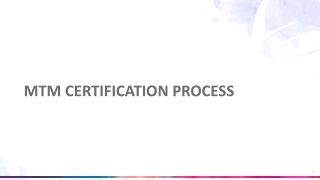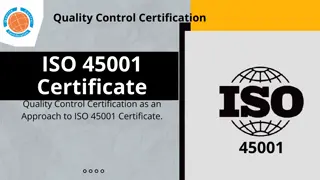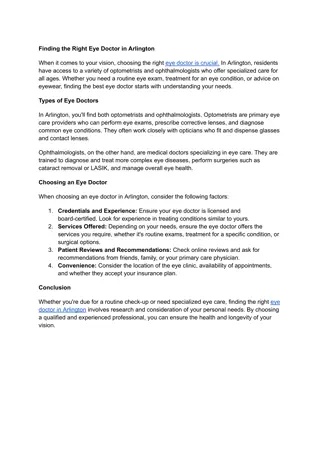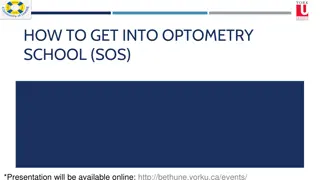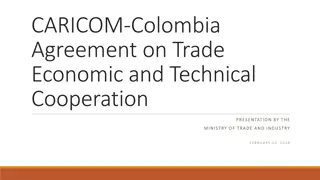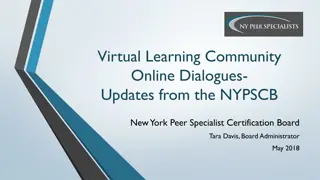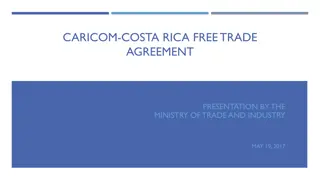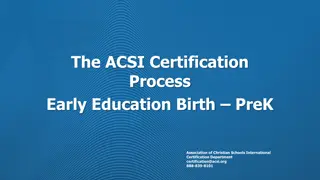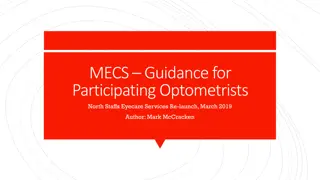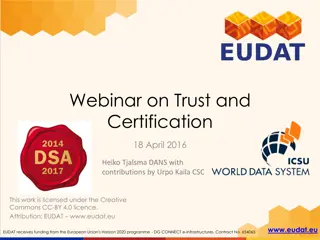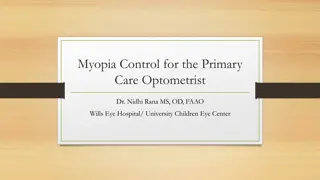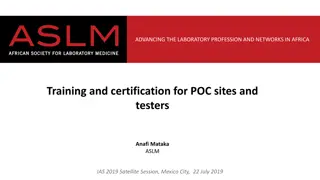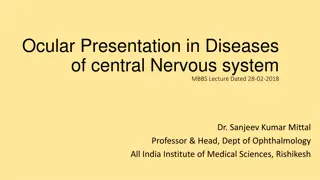Agreement Between Ophthalmologists and Optometrists in Certification
This study assesses the agreement between optometrists and ophthalmologists in identifying patient eligibility for vision impairment certification. Results suggest optometrists perform equivalently to ophthalmologists in this certification process, providing valuable insight for improved patient care and certification protocols.
Download Presentation

Please find below an Image/Link to download the presentation.
The content on the website is provided AS IS for your information and personal use only. It may not be sold, licensed, or shared on other websites without obtaining consent from the author.If you encounter any issues during the download, it is possible that the publisher has removed the file from their server.
You are allowed to download the files provided on this website for personal or commercial use, subject to the condition that they are used lawfully. All files are the property of their respective owners.
The content on the website is provided AS IS for your information and personal use only. It may not be sold, licensed, or shared on other websites without obtaining consent from the author.
E N D
Presentation Transcript
Agreement between ophthalmologists and optometrists in the certification of vision impairment Rebecca Bartlett Clinical Lead Low Vision Service Wales Hywel Jones, Daniel Farewell (Division of Population Medicine, Cardiff University) Gwyn Williams (Department of Ophthalmology, Singleton Hospital) Jennifer Acton (School of Optometry and Vision Sciences, Cardiff University)
Background Registration of vision impairment allows access to services and support, and the collection of epidemiological information People who are eligible to be registered as having a vision impairment firstly require a certificate of vision impairment to be completed by a consultant ophthalmologist In 2018, 1455 new CVIs were given, 68% of these noted dry AMD as diagnosis It is estimated that up to 51% of those eligible for certification are not certified Hospital capacity pressures
Aim To assess the agreement between LVSW optometrists and a consensus panel, in identifying patient eligibility for certification, relative to the agreement between ophthalmologists and the consensus panel
Methods Case records from 40 individuals were selected at random, stratified by the three categories of severity of sight loss from the LVSW database and anonymised Details from each case record were transferred to a proforma The consensus panel, 30 consultant ophthalmologists and 99 low vision optometrists reviewed 40 virtual cases The eligibility outcomes from the ophthalmologists and the optometrists were compared to the consensus panel outcomes for both dichotomous and trichotomous ratings
Results Our data show that optometrists perform equivalently to ophthalmologists in identifying patient eligibility for certification
Discussion This is the first study to measure the agreement between optometrists and consultant ophthalmologists in the consideration of eligibility for certification of patients with vision impairment Substantial proportion of clinicians relative to the overall workforce in Wales took part in the study Although based upon virtual cases rather than real life patient interactions, the cases used were taken from real cases and therefore were representative of real life clinical situations We are hopeful that our finding will go some way in supporting the potential role of LVSW optometrists in the process of certification of vision impairment
Thank you Sight Cymru Consultant ophthalmologists and low vision service Wales optometrists who participated Members of the consensus panel Research Team


